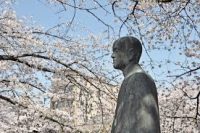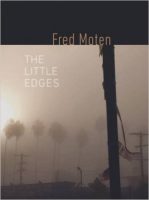July 1, 2016
Edited by David Sanders
Specimen Days
1689—Matsuo Basho, zen poet, leaves for 150 days journey on Honshu Japan.
1834—Jadwiga Łuszczewska, Polish poet (d. 1908), is born.
1896—Pavel G Antokolski, Russian poet/director (Syn) [NS], is born.
1919—Hans Bender, German poet, is born.
1953—Jacob D du Toit [Totius], South African poet/theologist, dies.

In Kyoto,
hearing the cuckoo,
I long for Kyoto.
—Matsuo Basho (1644–1694)
(translated by Jane Hirshfield)
“In Kyoto, / hearing the cuckoo, / I long for Kyoto.”—Matsuo Basho (trans. by Jane Hirshfield)
World Poetry
Israel Prosecutes a Palestinian Poet over Youtube Poem

With a flick of her wrist, Dareen Tatour turned a page in her notebook, smoothed the paper and began reading aloud in a slow, steady cadence. "The charges are like pieces of clothing. They brought me these clothes and forced me to wear them, from my toes to my head," she said, before bursting into excited laughter at the novelty of her work being translated into English.
Israel is prosecuting a Palestinian poet over a YouTube video.
Recent Reviews
Questioning Creativity
by Sean Singer
Because You Asked draws from fifteen years of Q&As after literary readings at Whitman College in Walla Walla, Washington. A varied collection of essays, lists, letters, and interviews in which writers address and respond to their audiences about the writing life and craft, the volume presents post-reading patter blown open. It gathers pieces from eighty-five writers, including major figures such as Mark Strand, Lydia Davis, Charles Simic, and Galway Kinnell, as well as a variety of younger writers, among them Carmen Giménez Smith, Sarah Vap, Oliver de la Paz, and Camille Dungy.
Through Tinted Plexiglass, Sharply
by Hugh Foley
Early in the second poem in Sarah Howe’s Loop of Jade, ‘Crossing from Guangdong’, there is a moment of “wheels within wheels” vision, typical of the sophistication with which Howe approaches the visible word in her poems.
“Because You Asked” draws from fifteen years of Q&As after literary readings at Whitman College in Walla Walla, Washington.
Broadsides
The Thing with Fathers
The New Poetry of the New Fatherhood
by Stephen Burt
“Women and men are more like each other than chalk is like cheese,” Eve Sedgwick once quipped. The same can be said, of course, for fathers and mothers: they are more alike than two proverbially distant things, and kids are kids—messy, dependent, charming, alarming—no matter the caregiver’s gender. Nonetheless recent American poetry about parenthood often looks different depending on whether mom or dad is writing.
Poetry Can Heal –It Helped Me through Depression
by Jay Griffiths
In Dante’s time, books were sold in apothecary shops: literature as medicine. I learned this when I was very ill, during an acute episode of manic depression, and I was struck by the profound metaphor behind this commercial fact. The apothecary of literature can heal, and I would need it desperately. I had experienced a psyche-fracture, which included hallucinations of wings, seeing my own and others’, these wings a metaphor for thought, the wings of the mind. Although I felt compelled to enact the urges of mania, I had a greater wish to hold very still and see what would happen if I let this madness take a metaphoric route. What happened? Poetry.
Recent American poetry about parenthood often looks different depending on whether mom or dad is writing.
Drafts & Fragments
‘World’s Largest Poem’ is Kids’ Tribute to Stoke Newington’s Radical History

Kids’ poems about Stoke Newington’s radical history form part of a giant mural at William Patten Primary School. East Enders actor Paul Bradley unveiled the artwork at the Church Street school on June 5. Its design is inspired by faded “ghost signs” – Victorian ads painted onto the brickwork of old shops.
Penguin Modern Poets Returns
Tom Etherington, a Junior Designer at Penguin Press, is behind the look of the relaunched Penguin Modern Poets, a revival of the series that originally ran in the 1960s. Here, he reveals more about the direction for the design of the publisher’s latest poetry collection
What Kind of Performer was Rilke?
by Frank Beck
We have audio recordings of Tolstoy and Tennyson–even one of Robert Browning. But no recordings of Rainer Maria Rilke are known to exist, although he lived until 1926. In a letter written in April of that year to Dieter Bassermann, Rilke noted that the phonograph could contribute "to a new orderly sense of responsibility toward the reading aloud of a poem (by which alone its whole existence appears)."
Kids’ poems about Stoke Newington’s radical history form part of a giant mural at William Patten Primary School.
Poetry In the News
Jo Cox and Philip Larkin's The Mower: Why Internet Mourners Turn to Poetry
As waves of shock and sadness broke across the country after the murder of Jo Cox last week, it was hard for anyone to find the right words for what had happened. But in the age of social media we are all commentators, and there is more pressure than ever for us to say something in the wake of tragedy. In the immediate aftermath, one language was being used again and again by people struggling to express how they felt. People were sharing poems.
Juan Felipe Herrera Writes Poem about the UCLA Shooting

U.S. Poet Laureate Juan Felipe Herrera wrote the poem, “Where We Find Ourselves,” which was published by the Los Angeles Times on June 3, 2016 in response to the shooting that took place at UCLA on June 1, 2016. The poem was dedicated to Professor of Mechanical and Aerospace Engineering William Klug, who was killed in the shooting, and the students of UCLA.
Juan Felipe Herrera wrote the poem, “Where We Find Ourselves,” in response to the shooting that took place at UCLA on June 1, 2016.
New Books
The Little Edges by Fred Moten
[Paperback] Wesleyan, 96 pp., $15.95

The Little Edges is a collection of poems that extends poet Fred Moten’s experiments in what he calls “shaped prose”—a way of arranging prose in rhythmic blocks, or sometimes shards, in the interest of audio-visual patterning. Shaped prose is a form that works the “little edges” of lyric and discourse, and radiates out into the space between them. As occasional pieces, many of the poems in the book are the result of a request or commission to comment upon a work of art, or to memorialize a particular moment or person. In Moten’s poems, the matter and energy of a singular event or person are transformed by their entrance into the social space that they, in turn, transform.
You Are Here: Poems New & Old by Leon Stokesbury
[Paperback] University of Arkansas Press,180 pp., $24.95
Winnowed from a distinguished career, then distilled, then polished and winnowed again, the poems in You Are Here are Leon Stokesbury’s most successful and finished from fifty year’s of published work. The selections from his earlier volumes are as fully realized as one would expect from the winner of the AWP Poetry Competition and the Poets’ Prize. But it is in Stokesbury’s new work, collected under the heading “These Days,” that he shows us something completely different. From a county carnival sideshow to Hitchcock’s Mount Rushmore, from John Keats’s backyard to the miseries of a failed crematorium operator, every turning of a page reveals a particular we didn’t see coming. You Are Here truly seems like a sideshow of this modern world, even when we read and find, amazed, our own selves looking back at us.
Animal People by Carol Rumens
[Paperback] Seren, 72 pp., $14.99

Animal People is the new collection by the distinguished poet Carol Rumens. Often inspired by and infused with the weathers of various seasons of the year, a strong sense of place also features in most poems, whether it be the dramatic mountain rock-scapes of Snowdonia or the gritty streets of London. The title poem is a ten-page meditation or symphony in varying movements, on the theme of autism and explores what it is to ‘be on the spectrum,’ particularly for a young girl, and what the autistic perspective may mean for individuals and for human destiny. Drawing on personal and family experience, this poem is infused with the author’s characteristic empathy, curiosity and humanity. There is a strong sense of commemoration in this collection, of time passing and of the challenges of mortality, and also a number of brilliant pieces that are influenced by translations or re-readings of classic works of literature.
Bukowski in a Sundress: Confessions from a Writing Life by Kim Addonizio
[Paperback] Penguin Books, 224 pp., $16.00
Kim Addonizio is used to being exposed. As a writer of provocative poems and stories, she has encountered success along with snark: one critic dismissed her as “Charles Bukowski in a sundress.” (“Why not Walt Whitman in a sparkly tutu?” she muses.) Now, in this utterly original memoir in essays, she opens up to chronicle the joys and indignities in the life of a writer wandering through middle age. Addonizio vividly captures moments of inspiration at the writing desk (or bed) and adventures on the road—from a champagne-and-vodka-fueled one-night stand at a writing conference to sparsely attended readings at remote Midwestern colleges. Her crackling, unfiltered wit brings colorful life to pieces like “What Writers Do All Day,” “How to Fall for a Younger Man,” and “Necrophilia” (that is, sexual attraction to men who are dead inside). And she turns a tender yet still comic eye to her family: her father, who sparked her love of poetry; her mother, a former tennis champion who struggled through Parkinson’s at the end of her life; and her daughter, who at a young age chanced upon some erotica she had written for Penthouse.
What Must Happen by Jeffrey Wainwright
[Paperback] Carcanet Press, 84 pp., $14.99

What Must Happen has concerns which might be grouped under three headings. First there are personal, mainly elegiac poems that recall parents, relations and friends. The second grouping, including the title poem, has poems on wider historical subjects some of which relate to the personal through Wainwright's recollections of his upbringing and the history of the Potteries. This group also includes a series of contemporary characterisations of some of the Roman gods. Thirdly the collection includes some extensive sequences best described as ‘variations’ in that they reiterate and vary particular words, phrases, images and most importantly rhythms.
The Little Edges is a collection of poems that extends poet Fred Moten’s experiments in what he calls “shaped prose.”
Correspondences
“Between Now and Already So”: Translating Uruguay's Idea Vilariño
by Catalina Gómez

Jesse Lee Kercheval is the author of the poetry collections Cinema Muto, Dog Angel, and the bilingual poetry collection Extranjera/ Stranger. Her translations include Invisible Bridge/ El puente invisible: Selected Poems of Circe Maia. She is also the editor of América invertida: An Anthology of Emerging Uruguayan Poets which is forthcoming from the University of New Mexico Press. She is the Zona Gale Professor of English at the University of Wisconsin. Photo of Jesse Lee Kercheval by Dan Fuller.
“Where language fades into cries or whispers”: an interview with Medbh McGuckian
Medbh McGuckian’s new selected, The Unfixed Horizon, contains over 130 poems from 14 collections. In honor of its publication, McGuckian talked to WFU Press interns Alex Muller and Shannon Magee about the concoction of angels, controlling the flow of time, and the virtue of poetry’s gentle intellect.
Jesse Lee Kercheval is the author of the poetry collections Cinema Muto, Dog Angel, and the bilingual poetry collection Extranjera/ Stranger.
Envoi: Editor’s Notes
July 2016 already. And while the days are getting warmer they're also getting shorter. That shift took place a week and a half ago. So here's a little poem about love and lust but also, as many poems are, about the passing of time.
To His Coy Mistress
by Andrew Marvell
Had we but world enough and time,
This coyness, lady, were no crime.
We would sit down, and think which way
To walk, and pass our long love’s day.
Thou by the Indian Ganges’ side
Shouldst rubies find; I by the tide
Of Humber would complain. I would
Love you ten years before the flood,
And you should, if you please, refuse
Till the conversion of the Jews.
My vegetable love should grow
Vaster than empires and more slow;
An hundred years should go to praise
Thine eyes, and on thy forehead gaze;
Two hundred to adore each breast,
But thirty thousand to the rest;
An age at least to every part,
And the last age should show your heart.
For, lady, you deserve this state,
Nor would I love at lower rate.
But at my back I always hear
Time’s wingèd chariot hurrying near;
And yonder all before us lie
Deserts of vast eternity.
Thy beauty shall no more be found;
Nor, in thy marble vault, shall sound
My echoing song; then worms shall try
That long-preserved virginity,
And your quaint honour turn to dust,
And into ashes all my lust;
The grave’s a fine and private place,
But none, I think, do there embrace.
Now therefore, while the youthful hue
Sits on thy skin like morning dew,
And while thy willing soul transpires
At every pore with instant fires,
Now let us sport us while we may,
And now, like amorous birds of prey,
Rather at once our time devour
Than languish in his slow-chapped power.
Let us roll all our strength and all
Our sweetness up into one ball,
And tear our pleasures with rough strife
Through the iron gates of life:
Thus, though we cannot make our sun
Stand still, yet we will make him run.